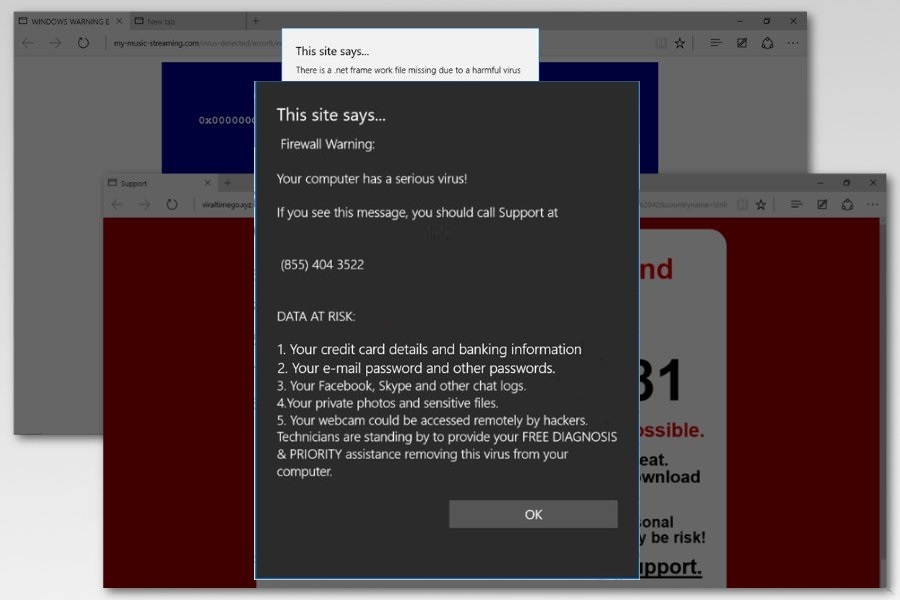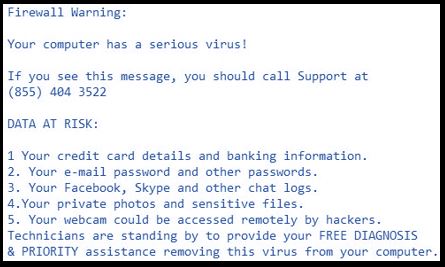What is “Microsoft Edge Virus” warning all about?
The reason you are here reading this article is that your system might have given you a warning saying “Microsoft Edge Virus” detected or you might have heard about it in the recent news.

So, is this warning real? Is your system infected with Microsoft Edge Virus?
The “Microsoft Edge Virus” warning or popup is nothing but a tech support scam done while viewing an infected website or through a widespread malicious program called Adware. This campaign specifically targets Windows OS.
This would make you believe that all your credentials are at risk and if an action is not taken immediately, all your details will be taken away from the computer.
Technically, these adware’s use complicated coding to by-pass the usual firewall of the computer they are designed to insert such fake pop-ups on the victim's computer which enables the malware developers to make money by scaring and fooling people.
The end goal of such Adware campaign
Adware is particularly designed to make money. Once an Adware program has infected a computer, it would inject small codes into the pages which you visit very often like your banking account or any social media.
This code will create numerous advertisement banners some may include fake security warnings like “Microsoft Edge Virus” or insert a sponsored ad on the pages you are viewing.
Web browsers are always under the radar
When your computer is infected with an adware, all your web browsers like Google Chrome, Mozilla Firefox, Internet Explorer, and MS Edge may redirect you to fake security warnings or to sponsored advertisement banners.
Beware of the scammers

Users are provided with a Toll-free number (855) 404 3522 to immediately contact them.
They will then guide you through the malware removal process by taking control of user’s computer but what they really do is infect the system with some malware and change the system settings.

Beware the "Microsoft Edge Virus" error is nothing but a scam pop-up like any other advertisement pop-up, it has nothing to do with Apple.
These technicians will claim to be Apple certified technicians and they will show the user how badly their system is messed up and by scaring the user they would trick the user into paying them for the fix.
It’s a scam but you still have an adware
Although an adware might not damage any files or Windows system, it will certainly annoy you with the frequent notification or ad banner.
Adware is not a virus and it will not harm any of your personal files, but on the other hand, it is a widespread malicious program that generates many such pop-ups and the most shocking fact about an adware program is that it would weaken the firewall of your computer internally and would make way for other malicious programs which include spyware, ransomware, and other malicious programs.
How does an Adware spread?
- Initially, adware installs into a computer via browser hijackers.
- When computers are impacted by a browser hijacker it would make way for other malware and one of the very common malware these days is Adware.
- Malware authors have developed such tools which can diagnose IP address and distinguish computers based on their security levels and infect them accordingly. In this case, the computers running on the legacy products or outdated security end up being the favorite targets of hackers.
- It can contaminate the PC through restricted websites or through infected websites. In this case, having a good security will help the user to block such websites.
- Adware can get into a computer through portable devices like USB stick, portable hard drives or through any other transferable media.
- Hackers can also infect a computer using freeware programs, this has become the easiest and quickest way of infecting a computer without user’s consent.
Common symptoms of adware include:
- The web browser would more show signs of instability and frequent crashes.
- The default configuration of the web browser is modified i.e. the default home page and the default search engine is changed.
- A victim might see new extensions and add-on toolbar in the top panel of your web browser.
- Whenever a victim tries to open anything, he is been redirected to some random website which may either display advertisement banners or would give fake security warnings.
- Poor program execution, moderate reaction time as the ads would fly out of the blue.
- Even if the web browsers are not active the infected computer would display ads which would result in system crashes from time to time or PC would boot up for unknown reasons.
- Security program and the inbuilt firewall is crippled.
- New icons are added to desktop pretending to be for some kind of security.
Tips to Prevent virus and malware from Infecting Your System:
- Enable your popup blocker: Pop-ups and ads on the websites are the most adoptable tactic used by cybercriminals or developers with the core intention to spread malicious programs.
So, avoid clicking uncertain sites, software offers, pop-ups etc. and Install a powerful ad- blocker for Chrome, Mozilla, and IE
- Keep your Windows Updated: To avoid such infections, we recommend that you should always keep your system updated through automatic windows update.By doing this you can keep your device free from virus.According to the survey, outdated/older versions of Windows operating system are an easy target.
- Third-party installation: Try to avoid freeware download websites as they usually install bundled of software with any installer or stub file.
- Regular Backup: Regular and periodical backup helps you to keep your data safe in case the system is infected by any kind of virus or any other infection.Thus always backup important files regularly on a cloud drive or an external hard drive.
- Always have an Anti-Virus: Precaution is better than cure. We recommend that you install an antivirus like ITL Total Security or a good Malware Removal Tool like Download Virus RemovalTool
